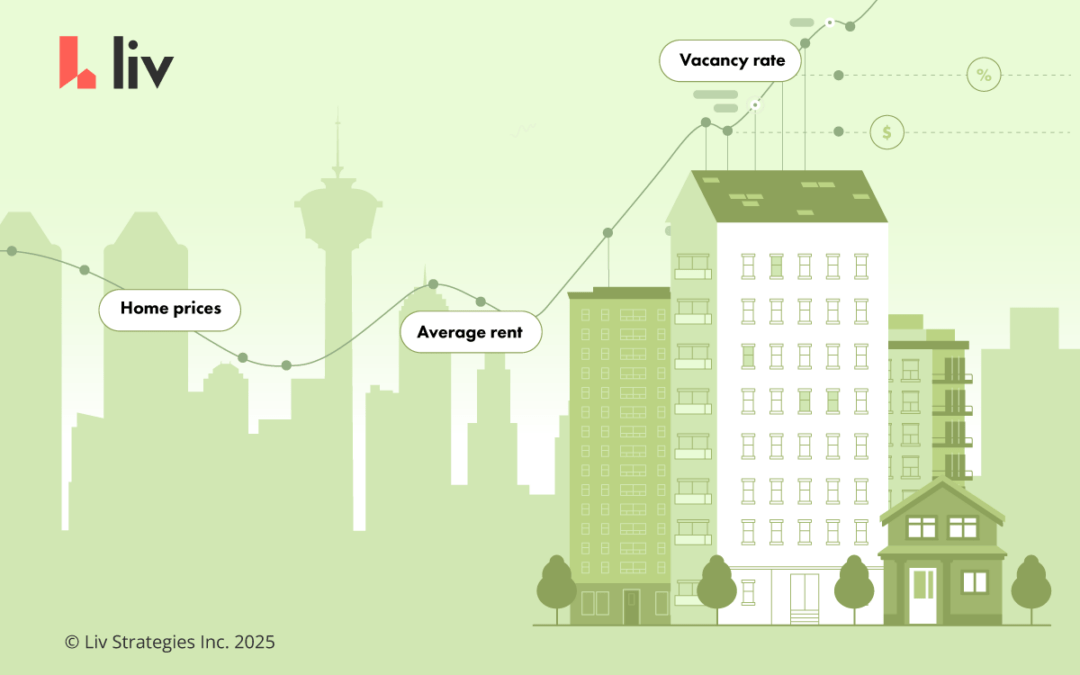Eviction is one of the toughest things you can experience while renting. The process can be long, confusing, and stressful. For any Toronto renters and landlords who find themselves having to deal with an eviction, Ontario has some guidelines that you need to know.
To make sure you’re protected and clear about the next steps, you’ll want to be aware of the rules— and your responsibilities. This will make the process go more smoothly and perhaps help it come to a friendly conclusion.
Our FAQ on evictions in Ontario will help both landlords and tenants navigate a serious situation.
liv.rent – Canada’s trusted house & apartment rental website
Search apartments, condos, and homes for rent.
What happens if you get evicted in Ontario?
If a tenant gets evicted in Ontario, the first step will be to get a written notice from the landlord. There are lots of reasons why a tenant may be evicted and different kinds of forms used to begin the eviction process.
Generally, the next steps are either
– The tenant ends the eviction by paying what’s owed or coming to an agreement with the landlord
– Or, the process continues and the landlord goes to the Landlord and Tenant Board (LTB) to schedule a hearing
At the hearing, both the landlord and tenant get a chance to make their cases. Then, the LTB will make a ruling. If they side with the tenant, then the eviction process will end.
If they side with the landlord, then they will issue an order to evict the tenant and that everything owed is paid back. This can be enforced by an officer called the sheriff, who can come to physically evict the tenant if they’re still in the unit after the date they were ordered to leave by the LTB.
What happens if you owe rent or don’t pay it on time?
If renters fall behind on their payments, then landlords can give them a notice and start an eviction process as soon as the day after the first missed payment. Typically, an eviction process can be stopped by the tenant paying what they owe.
However, if they’re continually late on payments, then the landlord could file a Form N8 “Notice to End your Tenancy at the End of the Term.” In this case, they can’t end it by paying back what they owe and the eviction process continues.
Do tenants have to pay rent if they were evicted?
Yes, a tenant may have to pay owed rent plus additional expenses for their landlord if they are evicted. The landlord could get an order from the Landlord and Tenant Board to make the tenant pay.
Can a landlord force me to leave?
No, a landlord in Ontario cannot force a tenant to leave. The only person who can physically evict a tenant from a property is the sheriff or any police officers that the sheriff requests help from.
Landlords and private security hired by them are not allowed to remove anyone from their units. A sheriff will only come to a unit to evict a tenant after the landlord has gotten their eviction approved by the Landlord and Tenant Board.
Do I have to move if my landlord gives me an eviction notice?
Maybe. Ontario tenants might have to move if their landlord gives them an eviction notice. However, tenants don’t have to leave just because they got a notice. They could have options, including ending the eviction by paying owed rent.
What happens if you ignore an eviction notice?
Even if an eviction notice is ignored the eviction process continues. The landlord will go to the Landlord and Tenant Board (LTB) for an order to evict the tenant and that order will be enforced by the sheriff.
Can you get an eviction if you already moved out?
Yes, tenants can get evicted if they have already moved out. Whether the tenant is there or not, the landlord still has to follow guidelines to legally take possession of the suite. If a tenant leaves without informing the landlord, then the landlord could think the property is abandoned.
In the Residential Tenancies Act, Section 79 says that if a landlord thinks their tenant has left the unit, then they can apply to the board for an order terminating the tenancy as long as they’re owed rent.
What are the reasons why a landlord in Ontario could evict a tenant?
Ontario’s Residential Tenancies Act lays out the legal ways a landlord can evict a tenant. Here are the most common reasons why that might happen:
– A tenant didn’t pay rent
– A tenant lied or misrepresented their income to the landlord
– A tenant committed illegal acts
– A tenant caused unreasonable damage to a unit or building
– A tenant has been disruptive or unsafe
– A landlord needs to do extensive work on the unit
– A landlord needs the unit for them or a family member to live in
To get an eviction, the landlord will have to prove to the Landlord and Tenant Board that they have legal grounds for wanting to evict a tenant. If it’s later found out that they did not have a legal reason for wanting an eviction, they could get in a lot of trouble.
How long does an eviction take in Ontario?
The amount of time an eviction takes in Ontario varies, especially depending on the reason for the eviction. Plus, it’s up to the Landlord and Tenant Board (LTB) to schedule a hearing and make a decision if needed. As an example, an eviction because rent hasn’t been paid could take up to 75 or 90 days to finish.
There are so many factors to consider. For example, say a landlord needs a tenant out because they plan to demolish or renovate the unit. They’ll have to give the tenant 120 days’ notice. So, if the tenant decides to challenge this eviction, it can be a lengthy process.
Often, a landlord will first give an eviction notice. Then, depending on the reason for eviction, the tenant can make changes or repayments within seven days. If they don’t, then a landlord will have to apply to the LTB within 30 days of the date on the notice.
The LTB will likely schedule a hearing. After the hearing, if the board sides with the landlord, then the sheriff can come to physically evict a tenant any weekday after the board ordered them to move out.
Can I stop an eviction if I pay what I owe?
Yes, tenants can stop an eviction in Ontario by paying the rent they owe. However, they might also now have to cover additional costs to the landlord.
If the landlord wanted them out for missing rent, then they can get them the money they owe at any time to halt the eviction process. They have to pay it before the sheriff comes to change the locks.
What happens when a lease ends in Ontario?
When a lease ends in Ontario, tenants don’t have to leave. The tenant will transition from a fixed-term tenant to a monthly tenant.
They cannot be evicted only because the lease is up. Everything inside the Ontario standard lease form that was signed by the landlord and the tenant still applies.
Can landlords make tenants move out for renovations?
Yes, but tenants could have options. The landlord will have to give the tenant a written 120 days (close to four months) notice on a Form N13 from the Landlord and Tenant Board (LTB.)
They can only do this if the work they need to do is so extensive that they need a building permit. In that case, people can’t be in the unit while the work is done. At that point, here are some options tenants can explore:
– Moving out (plus, you only need to give 10 days notice)
– Getting the landlord to pay compensation or let you move into another unit
– Telling the landlord (in writing) that you want to move back in once the work is done (plus, they can’t charge you a higher rent)
– Challenging the notice
Can landlords kick out tenants if they want to move in?
Yes. If a landlord wants a tenant’s unit for themselves, they could ask them to leave and evict them. You can be kicked out if:
– The landlord
– A member of their family
– Or, their caregiver
Wants to move into the space. Then, they have to be able to prove that they are planning to be there for at least a year.
Can new owners evict tenants in Ontario?
No, tenants can’t be evicted in Ontario just because the unit has been sold to new owners. The new landlord must honour the original rental agreement.
A tenant is allowed to agree to changes in the terms and conditions of the rental agreement, but they don’t have to. Plus, tenants don’t have to sign a new lease. Tenants should look carefully at anything they’re asked to sign.
A new landlord also has to follow all the legal rules in Ontario. If they want to evict a tenant, they’ll need a legitimate reason and they’ll have to follow the procedures.
Can landlords evict tenants for causing damage?
Yes, landlords in Ontario can try to evict tenants if they claim they have caused damage. A landlord would have to give an N5 form called “Notice to End your Tenancy For Interfering with Others, Damage or Overcrowding.”
Now, tenants do not have to immediately move out. They have options. If this is the first time in six months that they’ve been given an N5 form, then they can void the notice within seven days. They can try to:
– Fix the damage
– Replace the damaged property
– Or, pay the landlord’s estimate for what it will cost to replace or repair
If the tenant doesn’t cancel the notice or if they have gotten another N5 in the last six months, then the landlord can go to the Landlord and Tenant Board to file an L2 Form, “Application to End a Tenancy and Evict a Tenant.” The board can order tenants to pay for the damage and even evict them.
Can landlords evict tenants for causing disturbances?
Yes, landlords in Ontario can try to evict tenants if they claim they have caused disturbances. This could be considered anything that would interfere with others’ rights, for example, if someone’s playing music too loudly or having too many parties.
Depending on what kind of building you live in, to start an eviction process landlords would have to give either an:
– N5 Form called “Notice to End your Tenancy For Interfering with Others, Damage or Overcrowding”
– Or, an N7 Form called “Notice to End Your Tenancy for Causing Serious Problems in the Rental Unit or Residential Complex”
However, tenants do not have to immediately move out. They have options. If this is the first time in six months that they’ve been given an N5 form, then they can void the notice within seven days by stopping the disturbances outlined in the form.
If the tenant’s behaviour doesn’t stop, or if they have gotten another N5 in the last six months, then the landlord can go ahead with the process. The next step would be to go to the Landlord and Tenant Board, who have the power to evict tenants, and fill an L2 Form, “Application to End a Tenancy and Evict a Tenant.”
Can my landlord evict me if I did something illegal or unsafe?
Yes, landlords in Ontario can try to evict tenants if they claim that they have done something illegal or unsafe. A landlord would have to give an N6 form called “Notice to End your Tenancy For Illegal Acts or Misrepresenting Income in a Rent-Geared-to-Income Rental Unit.”
In the notice, they’ll detail what they allege are the illegal acts. They can include anything serious that could negatively affect the property or the other tenants living there. For example, they could allege that the tenant or someone they live with are:
– Making, trafficking, or possessing drugs with an intent to traffick
– Or running an illegal business
Now, tenants do not have to immediately move out. They can try to work things out with the landlord and see if there’s a satisfactory agreement they can reach. However, If that doesn’t happen, then the landlord will continue the eviction process. They will file an L2 Form called “Application to End a Tenancy and Evict a Tenant” with the Landlord and Tenant Board (LTB.)
Tenants will get a copy of this order from either the landlord or the LTB. Then, the board will schedule a hearing and make a decision on the application and whether the tenant will stay or go.
Does an eviction show up on a background check?
No, evictions do not show up on background checks. An exception would be if there was a criminal element to an eviction because criminal charges do come up in a background check.
What happens when you get a Notice of Hearing and Form L1?
Landlords use a Form L1 called “Application to Evict a Tenant for Non-payment of Rent and to Collect Rent the Tenant Owes” when they want to evict a tenant who hasn’t paid their rent.
A Notice of Hearing means that the Landlord and Tenant Board has scheduled a meeting where they can hear both parties out and make a decision on the eviction. However, tenants don’t have to immediately move out — they have options. They can:
– Pay what they owe
– Find a solution with the landlord, like a repayment plan
If tenants can’t pay or reach an arrangement with the landlord then they will both have to go to the hearing to make their cases.
What should I do before an eviction hearing?
Once you know you’re going to be headed to an eviction hearing, get legal advice as soon as possible. Next, you’ll need to collect your evidence that you’ll be presenting to the board. Remember to make at least three copies (one for the board, one for the landlord, one for the tenants) of everything you’re preparing.
Your evidence will differ depending on the reason for the eviction. Documents, photographs, digital evidence, receipts — keep everything and organize it so you’re able to present it. Plus, if you have witnesses, ask them to be there or get a summons from the board.
Once your evidence is organized, then it’s time to prepare what you’ll say to the board. Think about how you can make your case and tie in your evidence to support your argument. You can write notes or a script for yourself and do a run-through for practice.
What should I expect at an eviction hearing in Ontario?
A hearing at the Landlord and Tenant Board (LTB) can be either in-person or electronic. It’s a chance for both parties to make their case about the eviction. It’s a good idea to keep everything during the eviction process in writing and to make notes at the hearing.
For landlords:
– Must prove there’s a legal reason for evicting the tenant
– May provide evidence and/or witnesses
For tenants:
– May challenge or question the evidence presented by the landlord to the board A hearing at the Board is like a court case, but less formal.
– May explain why they feel they should not be evicted
– May provide evidence and/or witnesses
Once the hearing is wrapped up, the LTB will review what they heard and saw. They will make a decision and write it as an order.
My landlord doesn’t have an LTB order but wants to evict me — what should I do?
First, check to see if you’re covered by the Residential Tenancies Act. Most people in Ontario renting a private residential unit are protected by the RTA but there are certain arrangements that aren’t covered. If you aren’t covered, your options are limited and you should look for legal advice.
If you are covered, then know that landlords aren’t allowed to evict you on your own. They must follow an eviction process and get an order from the LTB. They can’t kick you out or ask the sheriff to come without this order.
You can let your landlord know that trying to evict you without this order could create a big legal headache for them later. Remind them that they should be applying for the LTB for a ruling first.
Evictions are never fun for landlords or tenants. If you find yourself facing this unfortunate last-case scenario, then be sure to keep records of everything.
>> Recommended Reading: Top 10 Tips for Renting an Apartment in Toronto (2021)
Keep all correspondence in writing and seek legal advice. Open and clear communication between everyone involved in a rental agreement will go a long way to help you avoid evictions completely.
Now that you have gotten a glimpse into what you need to know about them, you can move forward and rent with confidence.
liv.rent – Search apartments & houses for rent in Toronto
Search houses, rooms, condos and apartments for rent in Toronto. Chat instantly with verified landlords. Apply to multiple listings. Save your chat history & signed documents all in one platform.



0 Comments